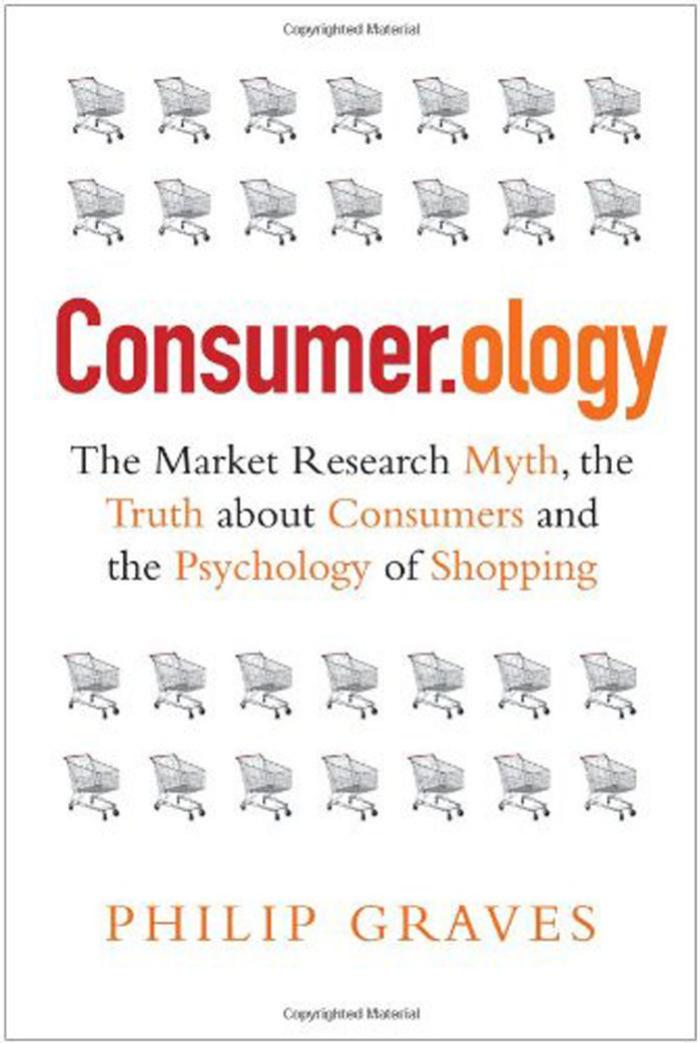Consumerology: The Market Research Myth, the Truth About Consumers, and the Psychology of Shopping by Philip Graves

Author:Philip Graves
Language: eng
Format: mobi, epub, pdf
Tags: Consumers, Marketing, Research, Consumer Behavior, Marketing research, General, Business & Economics
ISBN: 9781857885507
Publisher: Nicholas Brealey Publishing
Published: 2010-11-30T02:34:05+00:00
People will typically react in one of two ways: either they will glaze over and not “get” the concept at all, or they will play the game and start providing answers. However, what they’re doing in transactional analysis terms is going into a Child ego state; they get over the fact that they feel silly and get into what’s being asked of them. This raises the question of whether their usual interaction with the brand is from a Child ego state. If it is, then the thoughts, feelings, and behaviors they tap into in connection with the brand and the projective exercise may be an accurate reflection of those associated with moments of consumption. If not, then however well intentioned, the answers they provide are probably not an indication of their real thoughts and feelings. Not for the first time, I would argue, the convenience of a technique that can be very good at providing research data – very good in the sense of the volume produced and how interesting it seems – has little to offer by way of dependable accuracy.
Creative questioning styles can provide more interesting responses, but they are not necessarily more reliable. If any of the research techniques used has induced a frame of mind that is not present during the actual consumer experience, it is unlikely to have obtained an accurate picture of what people think.
13 Your customers can’t be trusted
It might seem sensible for organizations seeking to understand what they’re doing well or what they should do next to ask their current customers to evaluate their products or services. When the results come back, who could blame them for supposing that such ratings provide a representative indication of how they are perceived or what people want? However, even once all the potential distortions of the research process discussed to this point have been taken into consideration, another issue exists: people who have gone to the trouble of purchasing something tend to value it more highly than people who haven’t.
This was one of the reasons I was able to predict accurately that the advice I gave some friends on what new car to buy would be ignored. They called to ask my opinion, as they were considering replacing their large car for something more practical and took my interest in the motoring section of their Sunday paper as an indication of expertise. I listened to their needs, did some research, and told them which model would, in my opinion, be best. Unfortunately, another couple who were friends of theirs had recently purchased a car different from the one I was advocating and had enthused to them about it. I suspected, rightly as it turned out, that my balanced appraisal would stand little chance against the post-purchase-endowed priming from their friends.
This phenomenon, known as the “endowment effect,” was first identified by Richard Thaler in 1980. As the experiment with the coffee mug in the previous chapter revealed, it only takes a few moments of ownership for people to value something significantly more highly.
Download
Consumerology: The Market Research Myth, the Truth About Consumers, and the Psychology of Shopping by Philip Graves.epub
Consumerology: The Market Research Myth, the Truth About Consumers, and the Psychology of Shopping by Philip Graves.pdf
This site does not store any files on its server. We only index and link to content provided by other sites. Please contact the content providers to delete copyright contents if any and email us, we'll remove relevant links or contents immediately.
| Direct | Global |
| Industrial | Multilevel |
| Product Management | Research |
| Telemarketing | Web Marketing |
Influence: The Psychology of Persuasion by Robert B. Cialdini(4179)
The Miracle Morning by Hal Elrod(3911)
The Hacking of the American Mind by Robert H. Lustig(3580)
Pre-Suasion: A Revolutionary Way to Influence and Persuade by Robert Cialdini(3414)
Unlabel: Selling You Without Selling Out by Marc Ecko(2981)
Hidden Persuasion: 33 psychological influence techniques in advertising by Marc Andrews & Matthijs van Leeuwen & Rick van Baaren(2778)
Who Can You Trust? by Rachel Botsman(2732)
Kick Ass in College: Highest Rated "How to Study in College" Book | 77 Ninja Study Skills Tips and Career Strategies | Motivational for College Students: A Guerrilla Guide to College Success by Fox Gunnar(2720)
Purple Cow by Seth Godin(2698)
Ogilvy on Advertising by David Ogilvy(2682)
I Live in the Future & Here's How It Works by Nick Bilton(2524)
This Is Marketing by Seth Godin(2484)
The Marketing Plan Handbook: Develop Big-Picture Marketing Plans for Pennies on the Dollar by Robert W. Bly(2414)
The Power of Broke by Daymond John(2376)
Building a StoryBrand by Donald Miller(2361)
The 46 Rules of Genius: An Innovator's Guide to Creativity (Voices That Matter) by Marty Neumeier(2310)
Draw to Win: A Crash Course on How to Lead, Sell, and Innovate With Your Visual Mind by Dan Roam(2277)
The Tipping Point by Malcolm Gladwell(2204)
Market Wizards by Jack D. Schwager(2164)
